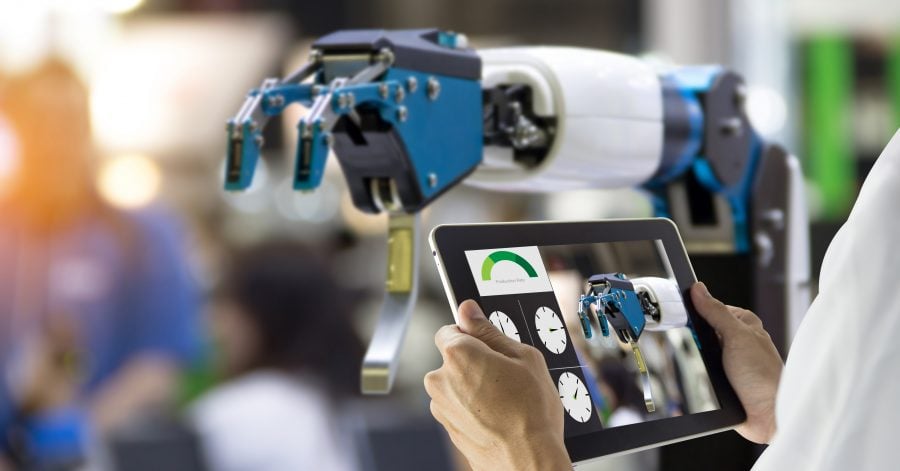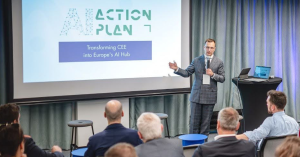Why do machines break? There can be multiple answers to this question: anything from inadequate maintenance, through a defective part, and even misuse. Such unpredicted disturbances can have serious implications for the production or distribution of products and services. So far, no universal solution has been created for this problem, yet entrepreneurs are implementing various innovative solutions to remove surprises from industrial operations.
There is a new member of the Southeast Europe startup ecosystem whose main goal is to do exactly that – in a nutshell, Amygda Labs uses AI and machine learning to optimize asset efficiency and remove unplanned maintenance.
The young company, co-founded by experienced ex-Rolls-Royce and ex-Airbus engineers, was recently supported by Sofia-based VC BrightCap Ventures. The funding will enable the team to accelerate product development and engage with more enterprise customers. The amount of the round is so far undisclosed, but one thing is sure: Amygda is to use Bulgaria as its tech hub base, from which the startup is going to service its European clients. The Recursive team talked to Faizan Patankar, CEO of Amygda, and gathered all the details about its current state and future plans.
Predictive analysis, machines, and bringing the strategy to the next level
In practice, Amygda’s platform offers centralized data on machines and their components, while monitoring their condition to call out for any abnormalities that may cause a problem. The company is currently focusing on providing a solution to the aerospace, railway, and industrial sectors. This is why Patankar gives an example of a company owning a Boeing and an Airbus, each with components from different producers, say Rolls Royce and GE Aviation engines. This would lead to several big challenges.
For one, there is the difficulty of having to log into at least four different systems to monitor the condition of the different machine components, then comes the inability to prevent damage that will slow down the transportation process, thus generating a loss of profits, due to maintenance costs. Amygda can solve that by predicting a problem that may arise up to 50 machine cycles before it occurs, he explained, thus saving costs for companies in the mentioned industries.
“Operational efficiency proved to be crucial during the pandemic and will remain a top-priority topic in the post-pandemic world. Enterprises have to learn to achieve more with less, and efficiency will play an immense role from now on. And this is especially valid for industrial assets where every minute of inefficiency costs millions. Faizan and his team have built something unique – Amygda helps enterprises solve some of the toughest challenges in the maintenance process, enabling predictive, reliable, and efficient operations,” shared in front of The Recursive, Georgi Mitov, Managing Partner at BrightCap VC.
So far, Amygda has had 2 case studies, including one with NASA, during which the system analyzed one of its turbofan engines that had 100 different failures, and it predicted the damage would happen. Amygda also is currently working with a UK-based leasing company that supplies railway engines and carriages to train operators. During their project, the startup uses its platform to help with the prediction of train engine malfunctions during the winter months and has managed to cover 100 billion data points and categorize engine failures and apply different tactics towards solving the problems before they happen.
European expansion, vertical diversification, and the role of the Bulgarian hub
The current focus on these traditional industries is just the first step for Amygda, which plans to then turn to categories that are about to develop in the next few years. One example is the autonomous car industry, which is predicted to reach $1.33B by 2027. Patankar shared that the Amygda solution can make autonomous vehicles more reliable, by predicting on-the-road breakdowns that can possibly happen and assessing the risk for a given trip to present the information to customers of, let’s say, self-driving Uber.
The short-term priorities of Amygda for 2021 are to continue validating the solution’s effectiveness and to also expand their team in order to meet their expansion goals after the pre-seed round. “We’ve now in the process of deploying with two customers, one actually in Bulgaria, and one in the UK,” Patankar shared. Bulgaria is to have an important role for Amygda, as it will actually be the tech hub where the operations for European clients will be managed by the local team.
In order to create such a team, Patankar is planning to implement early training, partly led by the immaturity of the AI and ML sectors in terms of qualified cadres. “I don’t think anybody can say that they’ve got five years of machine learning experience in the industry, such people are very rare and located in very specific places, geographically speaking,” Patankar reflected, adding that internships specialized in how ML works in the industrial domains is a possibility the company is considering.
When it comes to the Bulgarian ecosystem, Patankar believes in the quality of local specialists but outlines the fact that they lack the confidence innovative companies also look for. “I think it’s a challenge that we need to solve with the Bulgarian system, people just need to have more confidence in themselves, because, from my perspective, Bulgaria has some really good talents,” he concluded.
This is not the first international tech company to open a base in Bulgaria after an investment from BrightCap Ventures. In June 2020, WOOM, whose app helps women track their cycles of fertility, announced opening an office in Sofia. More recently, US-based IT process automation Pliant, led by Vess Bakalov, also expanded its team in the country following a round in which BrightCap participated.








